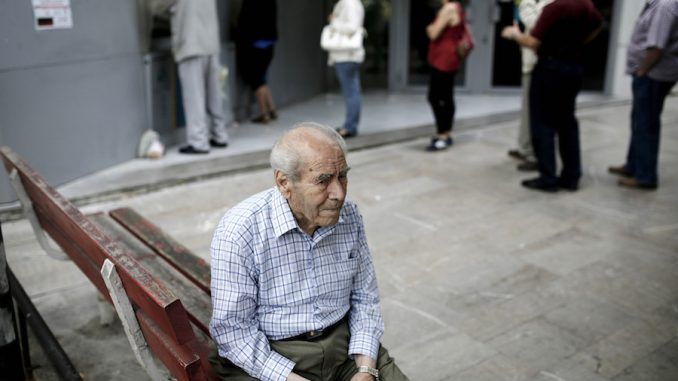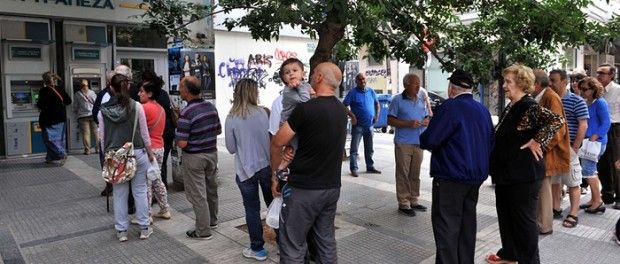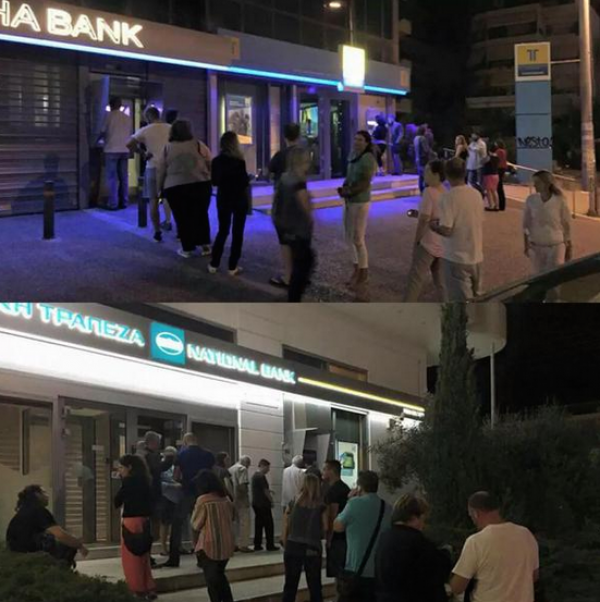
Bailout talks between Eurozone ministers and Greece collapsed on Saturday, and now the country is on the brink of collapse.
Greece may become the first country to actually leave the Eurozone.
Citizens are rushing to at ATMs to withdraw their money, ahead of MPs voting on a bailout referendum on Saturday night, which will decide whether or not Greece accept Europe’s austerity program and, ultimately, whether they leave the Eurozone.

BYPASS THE CENSORS
Sign up to get unfiltered news delivered straight to your inbox.
You can unsubscribe any time. By subscribing you agree to our Terms of Use


Photo: Long cues at #Greek ATM’s after announcement of referendum – @MakridisAkis pic.twitter.com/InrhjHt1Vr
— Conflict News (@rConflictNews) June 26, 2015
Cnn.com reports:
Unable to borrow from financial markets, and unwilling to strike a deal with Europe, Greece will struggle to pay its bills — let alone service its debts — without printing its own currency.
After weeks of talks, Prime Minister Alexis Tsipras said late Friday he could not accept the terms being offered by Europe and the IMF.
He said he would recommend that Greeks vote against them in a referendum on July 5. That brought an abrupt end to a series of discussions aimed at finding a way for the creditors to release the remaining 7.2 billion euros of Greece’s huge bailout, in return for budget savings and economic reforms. Now European leaders will focus on a Plan B — how to limit the damage of a Greek default.
“The euro area authorities stand ready to do whatever is necessary to ensure financial stability of the euro area,” the finance ministers said Saturday.
The euro is much better placed now than a few years ago to withstand such a shock. Greece’s debt is mainly in the hands of other governments, rather than foreign banks or investors.
The European Central Bank has launched a program of massive monetary stimulus, and the risk of contagion is reduced because countries such as Spain, Portugal and Ireland are all growing again. Europe has also adopted new rules to help countries that get into difficulty.
The damage to Greece will be much more severe. The prospect of a default may force the European Central Bank to curtail the emergency funding that has been keeping Greek banks afloat this year.
That’s because it would have to apply a big discount to the value of Greek government debt the country’s banks use as collateral for ECB funds.
The ECB said it would hold a meeting “in due course” to discuss the situation. Its decision will determine whether Greek banks have enough cash to open Monday, and if they do, whether they’ll have to impose capital controls — restricting the amount people can withdraw.
Every ATM I drove by has lineups and they are growing. pic.twitter.com/D23N5a3moR
— Sakis Michalarakos (@SakisMicha) June 26, 2015
Left-wing leader Tsipras was elected earlier this year on a promise to end austerity. But Europe and the IMF have largely stuck to their guns, arguing that Greece needs to reform its economy and generate big enough surpluses so it can service its enormous debts.
European governments were caught between trying to find a way to help Greece recover from five years of crisis, and concerns among their own voters about throwing good money after bad.
Tsipras said the demand by the bailout lenders for more labor market reform, cuts to pensions and public sector wages, and higher taxes on food, restaurants and tourism amounted to an attempt to humiliate the Greek people.


